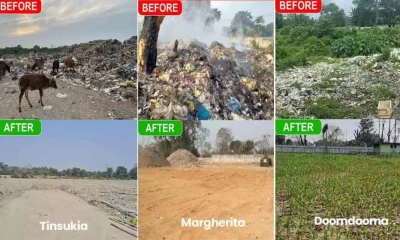Tinsukia district in Assam has achieved a remarkable feat by becoming the first in the Northeast to eliminate legacy waste through bio mining. This ambitious initiative, launched in 2023 by the Tinsukia District Administration in collaboration with five Municipal Boards, including Tinsukia, Doomdooma, Digboi, Margherita, and Makum Municipal Board, aimed at making the district free from legacy waste.
Announcing the achievement, Assam Chief Minister Dr Himanta Biswa Sarma wrote on a social media post, “Contributing to Prime Minister Narendra Modi’s Mission LiFE, Tinsukia has become Northeast’s first district to eradicate legacy waste through bio mining. At least, 1.53 lakh MT of waste has been treated, freeing up 30+ acres of land for developmental projects.”
Supported by Oil India Limited’s CSR fund, the project has successfully treated 1.53 lakh metric tons of waste, reclaiming over 30 acres of land for developmental purposes.
Initially, the initiative faced challenges, including foul smells and environmental concerns, but it progressed with determination. Bio mining of Legacy Waste from Tinsukia and Makum Municipal Board kick-started the project, treating 75,000 metric tons of waste at the Tingrai dumpsite in Tinsukia.
Furthermore, substantial amounts of waste were treated in other Municipal Boards, including 18,000 MT in Doomdooma, 25,000 MT in Digboi, and 30,000 MT in Margherita. This initiative aligns with the Assam Government’s Green Agenda, highlighting compliance with NGT guidelines.
Call And Fix initiated the project execution across all ULBs, as stated by Tinsukia District Commissioner Swapneel Paul. The comprehensive waste treatment across all sites has resulted in reclaiming over 80 bighas of land near urban centres in the district, paving the way for future development.
Moreover, an agreement with Dalmia Cement ensures sustainable waste management, where Refuse-Derived Fuel (RDF) produced during the process is utilised by cement factories. Tinsukia’s exemplary approach to land reclamation through bio mining of legacy waste positions it as a model district for environmental sustainability and developmental progress.
Know About Bio Mining
Bio mining, also referred to as bio leaching, employs micro organisms to extract metals from ores and solid materials. These micro organisms produce organic compounds that bind with metals, facilitating their extraction from the surrounding environment.
This process of bio mining not only offers a sustainable solution for metal extraction but also serves as an effective method for environmental remediation, particularly in sites contaminated with metals. Additionally, bio mining presents an economically viable alternative for recovering heavy metals from low-grade ores and waste materials.
Several factors influence the efficiency and success of bio mining, including the type of ore, geographical location, metal concentration, mineral composition, and the chosen process methodology.
Bio mining operations can be carried out using either stirred tanks or irrigated systems. In irrigated systems, an acidic-ferric iron solution containing acidophiles is commonly utilised for metal extraction processes. These systems offer flexibility and efficiency in metal recovery while minimising environmental impact.

















